National Enforcement and Compliance Initiative: Mitigating Climate Change
Climate change continues to accelerate every year, with record temperatures, devastating wildfires, and catastrophic storms creating substantial threats to public health and safety, water resources, agriculture, infrastructure, ecosystems, and the economy. If we fail to take decisive action by the end of this decade, searing heat, widespread drought, coastal flooding, and extreme weather events will become even more commonplace than they are today. The Mitigating Climate Change National Enforcement and Compliance Initiative or NECI addresses three separate and significant contributors to climate change:
- methane emissions from oil and gas facilities;
- methane emissions from landfills; and
- the use, importation, and production of hydrofluorocarbons (HFCs).
Problem
Methane is a climate super pollutant that is more than 25 to 28 times as potent as carbon dioxide at trapping heat in the atmosphere. Oil and gas systems and landfills are the second and third largest sources of methane emissions in the United States. HFCs are another, even more potent, climate super pollutant with a global warming potential hundreds to thousands of times greater than carbon dioxide. A global HFC phasedown is expected to avoid up to 0.5°C of global warming by 2100.
Widespread noncompliance related to the unauthorized import, production, and use of HFCs, and methane emissions from the oil and natural gas and landfill sectors have resulted in millions of tons of emissions of greenhouse gases or GHGs, as well as emissions of volatile organic compounds or VOCs and hazardous air pollutants or HAPs, which have serious impacts to public health.
Goals
More information on EPA’s work to mitigate climate change is available on the Agency’s Addressing Climate Change in Enforcement and Compliance Assurance web page.
FY 2024 Results
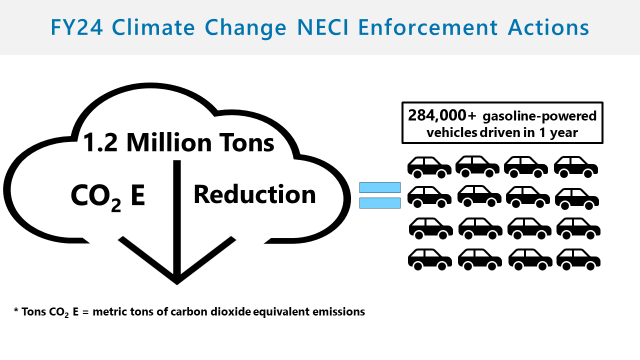
In fiscal year (FY) 2024, EPA made significant progress, across all three sectors, towards meeting the Climate Change NECI goals. EPA conducted hundreds of inspections and other compliance monitoring activities and resolved 30 civil enforcement cases. These cases led to emission reductions equivalent to 1.2 million metric tons of carbon dioxide, the equivalent of taking 284,000 gasoline powered vehicles off-the-road for one year.
Oil and Gas Inspections and Off-site Compliance Monitoring
In FY 2024, the EPA conducted 353 oil and gas inspections and 43 offsite compliance monitoring activities, such as aerial surveillance and information gathering activities.
Inspections were concentrated in areas of the country with significant oil and gas activity.
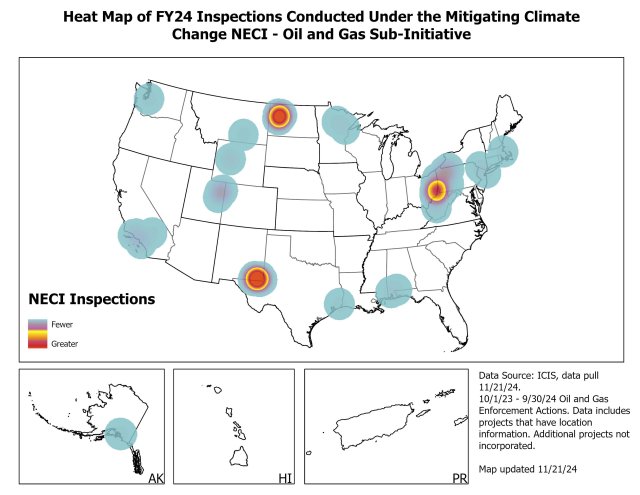
Oil and Gas Enforcement Cases
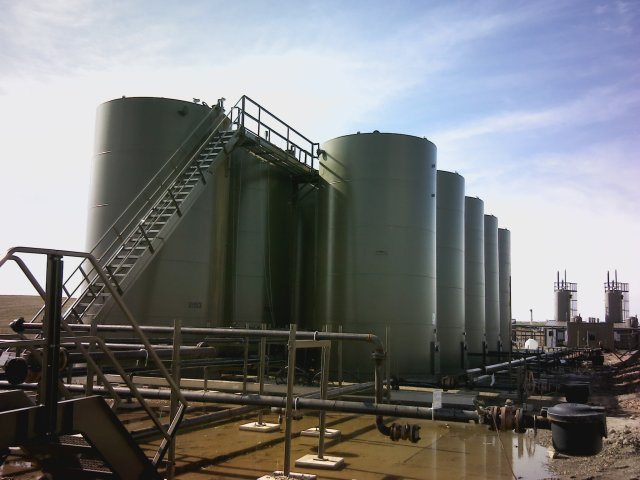
In FY 2024, EPA concluded 19 oil and gas enforcement cases resulting in emissions reductions of over 829,000 metric tons per year or tpy of carbon dioxide equivalent methane and over 33,000 metric tpy VOCs, and imposed almost $72 million in civil penalties. Examples of enforcement accomplishments include:
Marathon Oil Company: On July 11, 2024, the United States agreed to a settlement with Marathon Oil Company for Clean Air Act violations at nearly 90 oil and natural gas production facilities located on the Fort Berthold Indian Reservation in North Dakota. Marathon agreed to pay a $64.5 million civil penalty, to date the largest Clean Air Act stationary source penalty and implement compliance related requirements at a cost of $177 million. As part of the settlement, Marathon will ensure compliance with permitting requirements for existing and new facilities. Marathon also will comply with design, operation, and maintenance requirements that will reduce emissions from 169 oil and natural gas production facilities. Over the term of the agreement, the requirements are expected to reduce almost 20,000 metric tpy of VOCs and over 403,000 metric tpy of carbon dioxide. (Read Marathon Oil Company 2024 Clean Air Act Settlement)
Enterprise Gas Processing LLC, and Enterprise Gas Products Operating LLC: On July 8, 2024, the United States and state of Colorado filed a settlement agreement with Enterprise Gas Processing LLC and Enterprise Gas Productions Operating LLC (Enterprise) for Clean Air Act and state clean air law violations at the Meeker natural gas processing plant in Colorado. Enterprise agreed to pay a civil penalty of $1 million. As part of the settlement, Enterprise will ensure compliance with leak detection and repair requirements at the Meeker gas plant and install equipment that reduces the amount of emissions released from the facility. The settlement is expected to reduce 41 metric tpy of methane and 122 metric tpy of VOCs. (Read the Multi-agency Clean Air Act Settlement for Meeker Gas Plant press release)
The Williams Companies, Inc., and Harvest Four Corners, LLC: In December 2023, the United States, the Southern Ute Indian Tribe, and the states of Alabama, Colorado, West Virginia, Wyoming, and Louisiana finalized a settlement agreement with the Williams Companies, Inc., and Harvest Four Corners, LLC for Clean Air Act and state clean air law violations at their natural gas processing plants. Williams agreed to pay a civil penalty of $3.75 million. As part of the settlement, Williams and Harvest also will ensure that 15 natural gas processing plants come into compliance with existing regulations, at a cost of $18 million. To address the environmental harm caused by the violations, estimated to be 630 metric tpy of dangerous VOCs, and 1,065 metric tpy of methane, Williams agreed to perform equipment leak monitoring and leak repair projects at 80 compressor stations that are not otherwise subject to those requirements across the United States. (Read the 2023 Williams Companies, Inc. CAA Settlement Summary)
Apache Corporation: On April 11, 2024, the United States and state of New Mexico reached an agreement with Apache Corporation for Clean Air Act violations at 23 oil and gas production facilities in New Mexico and Texas. As part of the settlement, Apache agreed to pay a civil penalty of $4 million and will bring 400 facilities across New Mexico and Texas into compliance with existing regulations. Apache agreed to replace 400 pieces of equipment with zero-emitting equipment to address the environmental harm caused by the violations, which is estimated to be almost 8,870 metric typ of VOCs, and almost 22,760 metric tpy of GHG emissions, including methane. (Read the Apache Corporation Settlement Summary)
Texas Petroleum Investment Company of Lafayette, Louisiana: In April 2024, the EPA finalized two settlements with Texas Petroleum Investment Company of Lafayette, Louisiana, for Clean Air Act violations related to VOC emissions and permitting requirements of the Louisiana State Implementation Plan or SIP, at two oil and natural gas production facilities in Louisiana. As part of the settlement, Texas Petroleum will pay a civil penalty of $599,700, conduct continuous flame detection and flow monitoring at the Weeks Island Production Facility, and review operation and maintenance requirements at storage tanks located at the Weeks Island East Facility. (Read the Texas Petroleum Investment Company Weeks Island Production (pdf) and Texas Petroleum Investment Company Island East (pdf) Enforcement Documents)
Landfill Inspections
In FY 2024, EPA conducted 64 Landfill Inspections.
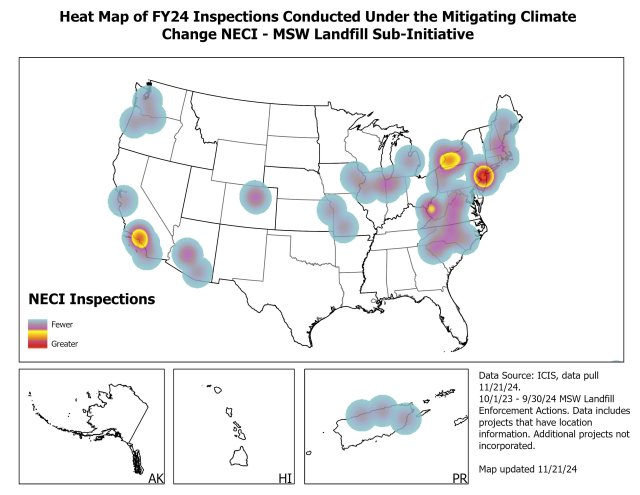
Landfill Enforcement Cases
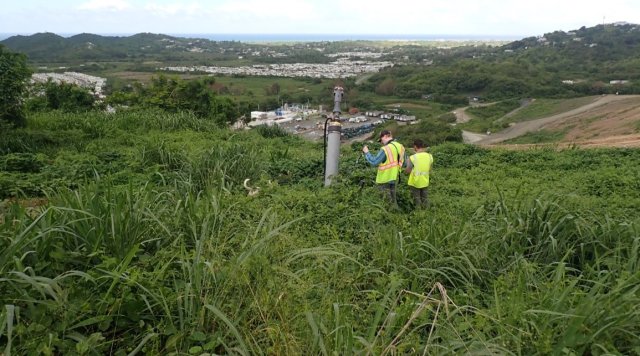
In FY 2024, the EPA concluded three civil landfill settlements resulting in emission reductions of upwards of 88,700 metric tons per year or tpy of carbon dioxide equivalent methane and at least 35 metric tpy of non-methane organic compounds. The EPA also imposed over $700,000 in penalties and projects through enforcement settlements that provide tangible environmental or public health benefits. Examples of enforcement accomplishments include:
Allied Waste Niagara Falls Landfill, LLC (Allied Waste): In January 2024, the EPA reached an agreement with Allied for Clean Air Act violations at its landfill location in Niagara Falls, New York. Under the settlement, Allied Waste paid a $671,000 penalty and is operating a gas collection and control system to reduce the amount of harmful chemicals, primarily methane, as well as other harmful organic compounds, released into the air. The settlement will result in an estimated reduction of 86,000 metric tons of carbon dioxide-equivalent methane emissions. The gas collection and control system also will prevent 32 metric tons of non-methane landfill gas emissions per year. (Read the Allied Waste CAA Violations at is Niagara Falls Landfill press release)
Hamm, Inc.: In October 2023, the EPA reached an agreement with Hamm, Inc. for Clean Air Act violations at its Hamm Sanitary Landfill in Lawrence, Kansas. Hamm failed to correct and re-monitor exceedances of the surface methane standard discovered during an EPA inspection within the required 10 days. As part of the settlement, Hamm agreed to pay a penalty of $4,206 and carry out an emissions monitoring project costing at least $30,000.
Hydrofluorocarbon Inspections
Hydrofluorocarbons or HFCs are fluorinated chemicals commonly used as replacements for ozone-depleting substances in refrigeration, air conditioning, aerosols, fire suppression, and foam blowing. HFCs have global warming potentials that can be hundreds to thousands of times more potent than carbon dioxide.
In FY 2024, the EPA focused its inspections on key ports across the nation to address the illegal import of HFCs. The inspections, including those of shipments identified by the U.S. Customs and Border Protection (CBP), addressed potential violations of the American Innovation and Manufacturing (AIM) Act of 2020 or AIM Act. The AIM Act mandates the phasedown of HFCs by 85 percent from historic baseline levels by 2036 and authorizes EPA to address HFCs in three main ways:
- Phasing down HFC production and consumption through an allowance allocation program,
- Facilitating sector-based transitions to next-generation technologies, and
- Issuing certain regulations for purposes of maximizing reclamation and minimizing releases of HFCs from equipment.
Hydrofluorocarbon Enforcement Cases
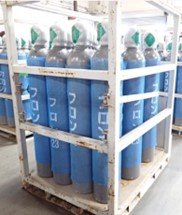
With the phasedown of HFCs, including a 30 percent reduction starting in January 2024, the EPA is diligently monitoring for a related potential increase in illegal imports. In FY 2024, the agency concluded nine civil cases resolving violations related to the illegal importation of HFCs and brought several criminal cases. Examples of enforcement accomplishments include:
Resonac America Inc.: In March 2024, the EPA reached an agreement with Resonac America Inc. to address the company’s illegal import of HFCs into the United States. Under the settlement, Resonac paid a $416,003 civil penalty and will safely destroy almost 1,700 pounds of HFCs. (Read the EPA Reaches Settlement with Resonac America for Illegal Import of HFCs press release)
HVAC Services: In April 2024, the EPA reached an agreement with HVAC Services, addressing the illegal importation of HFCs totaling over 24,000 pounds of R-404A, R-410A, and R-407C shipments from Mexico. These bulk substances were imported without the importer expending the requisite consumption allowances. The civil penalty required by HVAC Services in this case was $77,679.
More information on the EPA’s civil HFC enforcement cases is available on the Agency’s Enforcement of the American Innovation and Manufacturing Act of 2020 web page.
In addition to the nine civil cases, the EPA charged seven individuals in criminal cases for alleged smuggling of HFCs.
HFC Training and Capacity Building
In FY 2024, the EPA’s civil and criminal programs trained over 1,000 civil enforcement and federal law enforcement personnel on the AIM Act, HFCs and investigative methods to identify and investigate smuggled shipments of HFCs. These training events occurred both in person at various ports of entry and meetings around the country, as well as virtually.
Enforcement Alerts:
In September 2024, the EPA issued three enforcement alerts to highlight compliance problems concerning methane emissions from municipal solid waste (MSW) landfills and illegal imports of HFCs.
EPA Finds MSW Landfills are Violating Landfill Gas Emission Rate Calculation Requirements: This enforcement alert highlights results of recent investigations and enforcement actions that prompted the Agency’s concern with the uncontrolled release of landfill gas. The alert reminds MSW landfill operators and owners, and their consultants, of 1) the importance of properly identifying and documenting nondegradable wastes excluded in calculations and 2) collecting representative landfill gas samples for non-methane organic compounds analysis and emission calculations.
EPA Finds MSW Landfills are Violating Monitoring and Maintenance Requirements: This enforcement alert highlights recurring Clean Air Act compliance issues at MSW landfills leading to the significant release of methane and other air pollutants. The alert reminds MSW landfill operators and owners, and their consultants, of their obligation to conduct proper monitoring techniques and system maintenance to ensure compliance with the Clean Air Act’s MSW landfill requirements.
EPA Targeting Illegal Imports of Hydrofluorocarbon Super-Pollutants to Combat Climate Change: This enforcement alert emphasizes that the EPA is vigorously enforcing the AIM Act, using civil and criminal enforcement authorities to prevent the illegal import, production, sale, or distribution, and/or offering for sale or distribution of the HFCs. The alert provides information to the regulated community on common compliance issues to help ensure regulated entities can take the necessary steps to avoid potential EPA enforcement actions.
